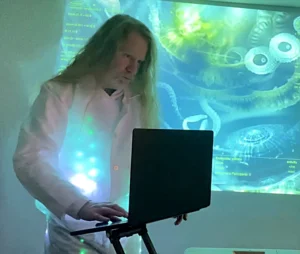Wednesday, November 12, 12 – 1 PM (lunch at 11:45 AM), Performing Arts and Humanities Building, 216, please RSVP
To attend virtually, please indicate this in RSVP
Eric Millikin, Assistant Professor, Visual Arts, was awarded the 2024 CIRCA-IMET Artist-in-Residence Fellowship, during which he worked on Mecha/Magical Marine Materials, an ongoing series of wearable electronic and robotic sculptures based on marine biology for performances with live-coded ambient sound and spiraling video projections. The work is based in part on the work of IMET Assistant Professor Allison Tracy as well as on Edgar Allan Poe’s tales of sea-faring science and the supernatural, including depictions of necromancers creating mechanical sea monsters.

Eric Millikin uses marine biology, hacktivist robotics, occult rituals, artificial intelligence, and extended reality as strategies for alchemical societal transformation and fighting wealth supremacy. Millikin comes from a working-class family, growing up in a mobile home down by the river in the dark woods of rural Michigan. He is a descendant of Mary Eastey who, along with her sister Rebecca Nurse, was executed during the Salem Witch Trials. His awarded residencies include Cow House Studios in rural County Wexford, Ireland; the Ayatana Biophilium Artists’ Research Program “Symbiosis,” hosted from Ottawa, Canada; and the VR residency “Artist is Absent,” hosted from Travneve, Ukraine as the Russian military invaded. A first-generation college graduate and National Merit Scholar, he earned his BFA from Michigan State University. He earned his MFA from Virginia Commonwealth University in Richmond, Virginia, where Edgar Allan Poe grew up, and he is now based in Baltimore, Maryland, where Edgar Allan Poe died. Millikin is an Assistant Professor in the Department of Visual Arts where he teaches courses in Animation and Interactive Media.
This event is open for full participation by all individuals regardless of race, color, religion, sex, national origin, or any other protected category under applicable federal law, state law, and the University’s nondiscrimination policy.